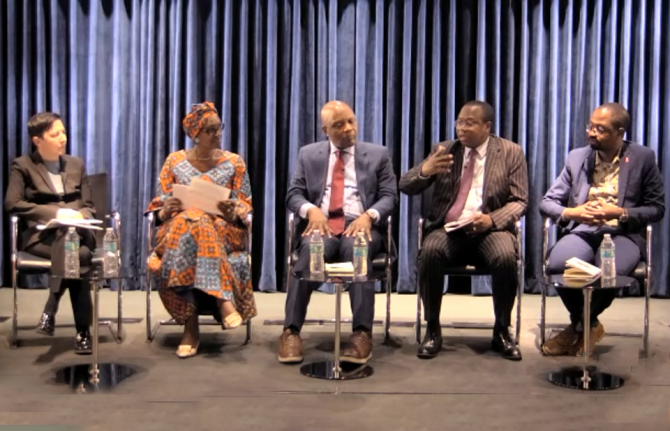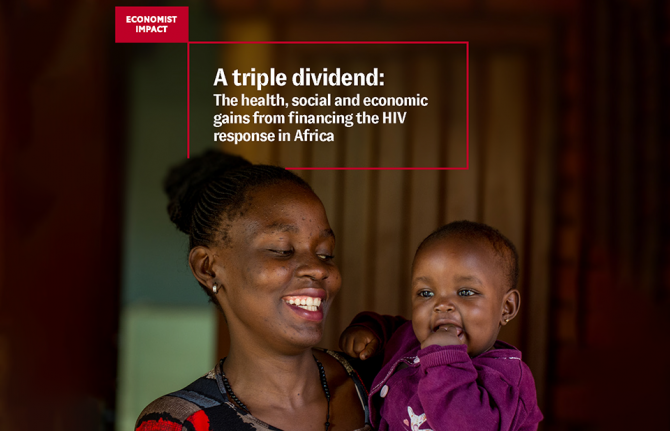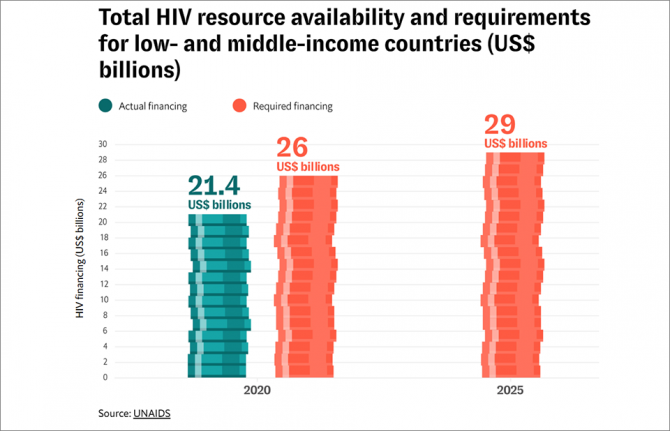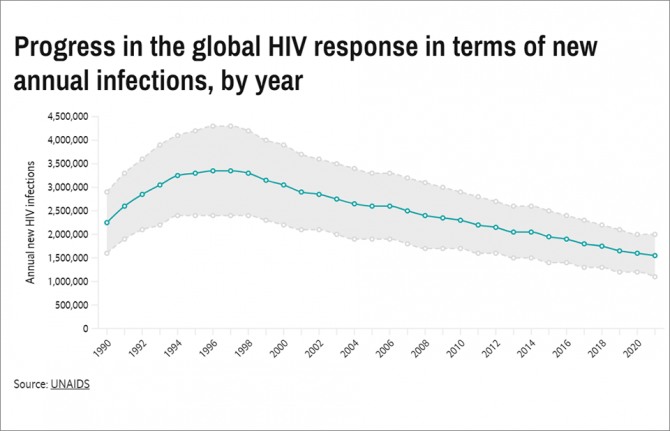




Press Release
A Triple Dividend: Fully financing the HIV response in Africa
12 April 2023 12 April 2023Fully financing the HIV response to get back on track to achieve the 2030 goals will produce substantial health, social and economic gains in African countries. These findings are highlighted in a new report, A Triple Dividend: The health, social and economic gains from financing the HIV response in Africa
WASHINGTON DC/GENEVA, 12 April 2023—Research and analysis by Economist Impact, conducted across 13 African countries, demonstrates that fully financing the HIV response will saves millions of lives and would produce substantial health, social and economic gains.
Not only would there be between 40% and 90% fewer new HIV infections, depending on the country, but investing in the HIV epidemic would also enhance educational outcomes, especially for young women and girls, reduce gender inequalities and boost economic growth.
“This report comes at a critical time with evidence that should act as a catalyst for political decisions to ensure full HIV funding, that will have substantial social and economic outcomes,” said Winnie Byanyima, Executive Director of UNAIDS. “It will put African countries on a path towards building more resilient healthcare systems and be better prepared for future pandemics.”
If the targets for fully financing the HIV response are met in South Africa for example, women aged 15-19 would account for almost 15% of the reduction in new HIV infections by 2030, despite making up less than 5% of the total population. In addition, increased HIV investments today would contribute to wider and sustained economic gains by 2030, and ultimately free up scarce resources going forward to address other critical health priorities. The report projects that South Africa’s GDP could be 2.8% higher and Kenya could see its GDP rise by 1.1% by 2030 if HIV funding targets are met.
“The United States Government was proud to join other United Nations Member states to adopt bold new commitments for AIDS financing by 2025” said Ambassador Dr John N. Nkengasong, U.S. Global AIDS Coordinator and Special Representative for Global Health Diplomacy. “Ending AIDS as a public health threat requires political, programmatic and financial leadership. All government sectors, including the Ministries of Finance, play a key role in increasing domestic financing to ensure that vulnerable populations are reached equitably and receive the prevention, care and treatment services they need.”
The report, A Triple Dividend: The health, social and economic gains from financing the HIV response in Africa, demonstrates that failing to mobilise the required funding to end AIDS as a public health threat by 2030 has substantial health, social and economic costs.
To assess these costs, Economist Impact, supported by UNAIDS, analysed scenarios in which 100% of financial resources required to meet the 2021 Political Declaration on HIV and AIDS targets were compared to a business-as-usual funding scenario where HIV current financing and service levels are maintained. It showed that the resulting improvements in health outcomes would also increase educational gains, which combined, generate increased productivity of both current and future generations, contributing to wider economic benefits.
“Countries in Africa are up against significant challenges to secure the necessary resources to increase domestic funding for the HIV response,” said Rob Cook, clinical programme director at Economist Impact. “Policymakers will need to think innovatively about how they can use existing financing more effectively. Drawing on existing community-centred networks could play a key role in both mobilising additional resources for the HIV response and ensuring that it is equitable and reaches those most in need.”
Recent global crises, including COVID-19 and the war in Ukraine, have hampered efforts to address the HIV epidemic and placed strong pressure on financing for health and other Sustainable Development Goals. Young women, children and other vulnerable populations will pay the highest price as pre-existing health and socio-economic inequalities widen. The significant fiscal challenges facing African countries has limited their ability to increase domestic financing of the HIV response and constrained overall health budgets. Economist Impact’s research points towards the need for policies that aim to both generate new revenue streams and maximise the use of existing funds and resources.
UNAIDS estimates that low and middle-income countries will need investments of US$ 29 billion annually to meet targets of ending AIDS as a public health threat by 2030. Funding levels in 2020 fell almost 30% below targets, making subsequent resource needs harder to achieve and putting upcoming targets further out of reach. UNAIDS projects more than 7 million AIDS-related deaths by 2030, but half of those can be averted if the HIV response is fully financed and policies are rightly oriented.
Global 2025 targets include reducing new HIV infections to under 370 000 (from 1.5 million in 2021), reducing HIV infections among adolescent girls and young women to less than 50 000 and reducing the number of people dying from AIDS-related illnesses to less than 250 000 (compared to 650 000 in 2021).
LAUNCH DETAILS
The Triple Dividend event and report will be launched at an event co-hosted by UNAIDS and PEPFAR to be held at the Kaiser Family Foundation on Wednesday 12 April in Washington DC at 3pm EDT / 9pm CET / 7pm GMT and will feature:
- Winnie Byanyima, Executive Director, UNAIDS
- Ambassador John Nkengasong, U.S. Global AIDS Coordinator and Special Representative for Global Health Diplomacy, PEPFAR
- Minister Mthuli Ncube, Minister of Finance of Zimbabwe
- Allan Maleche, Executive Director of Kenya Legal and Ethical Issues Network on HIV and AIDS (KELIN)
- David Humphries, Global Head of Health Policy, Economist Impact
The event will be moderated by:
- Jennifer Kates, Senior Vice President and Director of Global Health & HIV Policy, KFF
UNAIDS
The Joint United Nations Programme on HIV/AIDS (UNAIDS) leads and inspires the world to achieve its shared vision of zero new HIV infections, zero discrimination and zero AIDS-related deaths. UNAIDS unites the efforts of 11 UN organizations—UNHCR, UNICEF, WFP, UNDP, UNFPA, UNODC, UN Women, ILO, UNESCO, WHO and the World Bank—and works closely with global and national partners towards ending the AIDS epidemic by 2030 as part of the Sustainable Development Goals. Learn more at unaids.org and connect with us on Facebook, Twitter, Instagram and YouTube.
